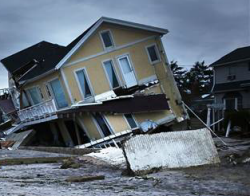Contrary to Hurricane Irene, Sandy left the Mid-Atlantic states with catastrophic damage. The areas hit the worst include New Jersey, New York & Connecticut. Initial estimates indicate that the total damages could exceed $50 billion, which would rank among the second costliest storms in U.S. history; behind Hurricane Katrina. Given the significant loss, many affected families are going to be submitting insurance claims very shortly, if they haven’t already done so. What can you do to increase the chances that your claim is paid quickly?
Review your insurance policy
You want to be sure that your insurance policy covers the damage to your home. For instance, many insurance policies do not include flood damage, which is likely to be the major cause of damage to homes impacted by Hurricane Sandy. You don’t want to submit a claim unless you have appropriate coverage for the damage as that can impact your insurance costs going forward.
Contact your insurance provider immediately
Even if you don’t have all of the documentation and pictures yet to support your claim which appears to be covered, your next move is to contact your insurance agent or the claims department. Some insurance companies will be responsive immediately, while others may take some time to get back to you. Either way, make sure that you continue to followup with your provider and send emails to show a clear audit trail. Being able to reference prior emails can go along way in getting the ball rolling as opposed to stating that you call every day.
Document the damage
Take as many pictures as possible and provide a detailed description with each picture so that the adjuster will understand exactly what happened and the sequence of events that led to the ultimate damage. The more details you can provide the adjuster, the greater the likelihood that your claim will be processed quickly. Incomplete documentation is one of the primary reasons that claims take longer than expected to process.
Reduce the risk of additional damage
The insurer will want to see that you’ve taken measures to reduce the risk of additional damage to the property. For instance, if you have broken windows or a damaged roof, the insurer will want to see that you’ve placed a tarp or protective shield over the damage. Of course, you don’t want to repair the home and make sure you take the pictures before you put on the tarp.
List the items you’ve lost
In addition to the broken windows and the hole in your roof, you may have other items that got damaged because of the tree that fell on your home. Make sure you document those items which may include a dresser, books, carpet etc.
Do whatever it takes to meet with the insurance adjust in person
It’s a heck of lot easier to explain the damage with an in person meeting with the insurance adjuster than through a phone call or letter. It’s best to be able to walk the insurance adjuster through the damage as you story will carry a lot of weight.
Don’t forget about the expenses if you’re temporarily displaced
If you had to evacuate and temporarily live in a hotel or an apartment, it’s possible the insurance company may reimburse you for those expenses.
FEMA may also be here for you
If you are unable to make much progress with your insurance company or another provider, you may qualify for federal emergency management assistance (FEMA). To qualify for federal disaster assistance, your losses must have occurred in an area covered by a Major Disaster Declaration as signed by the President of the United States. FEMA can be applied for if your insurance claim is taking more than 30 days to process, your insurance claims falls short of the cost to fix the damage and to cover the cost of temporary housing needs. If you believe you qualify, you can apply online at fema.gov and check the status within 24 hours. Typically, a FEMA inspector will contact you within 10 to 14 days to schedule a meeting to visit your property. Then, the inspector will submit the report to FEMA and you should hear back within 10 days as to whether or not you qualify for the grant.
More Questions? Browse answers or ask hurricane insurance questions online.
Related Articles
->Is Your Homeowners Insurance Policy Providing Adequate Coverage
->Why You May Need Umbrella Liability Insurance to Protect Your Assets
->The Tax Impact for a Natural Disaster
->Does It Make Sense To Get Renters Insurance?
->Is a Flood Insurance Settlement Taxable?


